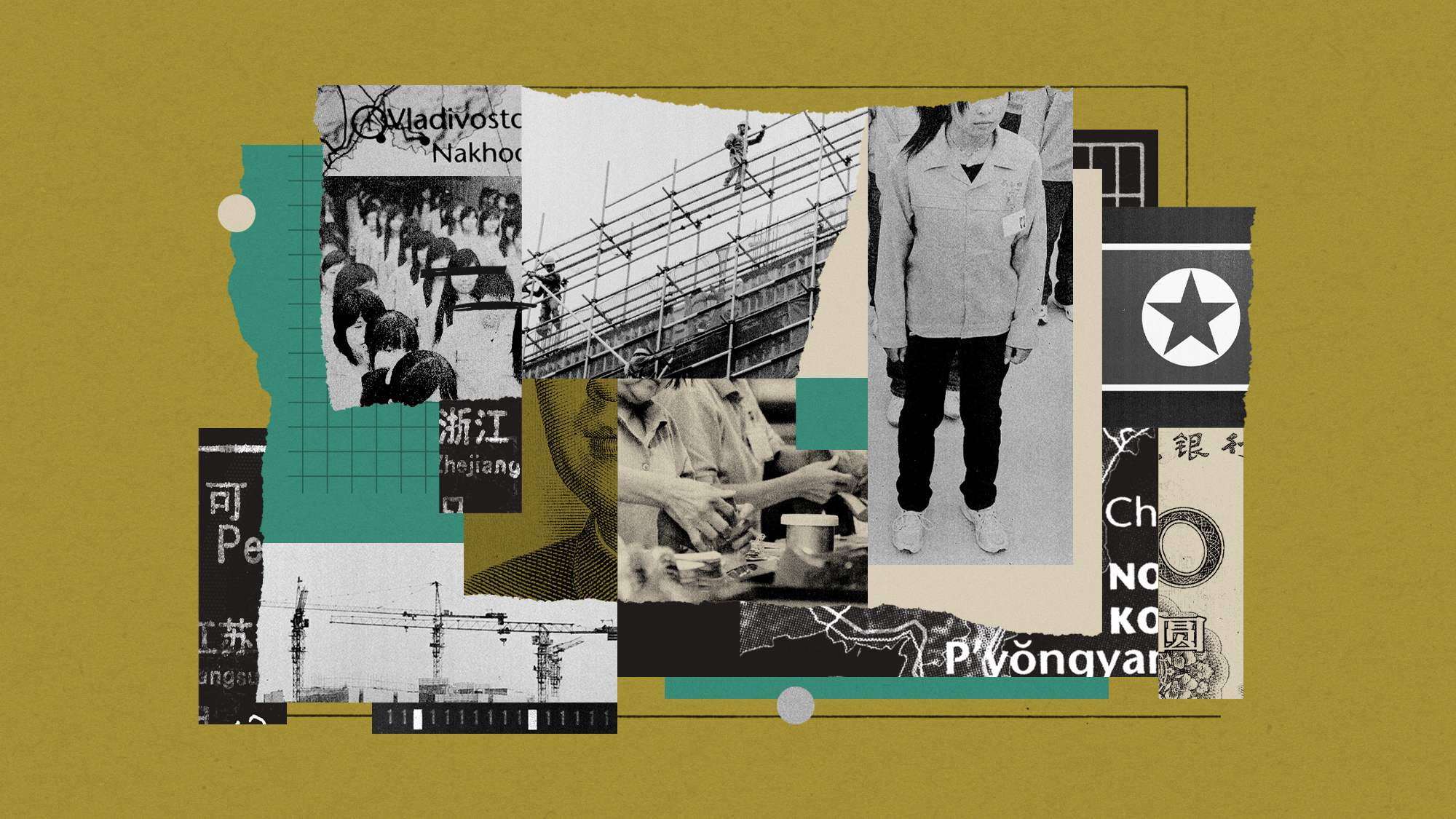North Korea's stranded migrant workers
Hermit kingdom sent labourers overseas to fund cash-starved regime and weapons programme, but shut borders during pandemic

A free daily email with the biggest news stories of the day – and the best features from TheWeek.com
You are now subscribed
Your newsletter sign-up was successful
Thousands of North Koreans working illegally in China have reportedly rioted to demand years of unpaid wages alleged to have been spent on funding Pyongyang's war machine.
About 2,500 North Korean labourers were owed a total of $10 million, Cho Han-bum, a research fellow at the Korean Institute for National Unification think tank, told NK News. Workers in 15 Pyongyang-operated factories in northeastern China are said to have "erupted" into riots after discovering that their wages had instead "been put towards building weapons", said BBC News.
According to South Korea's The Korea Times, at least one North Korean government official sent to monitor the labourers was killed during the "violent protests", near the North Korean border.

Sign up for The Week's Free Newsletters
From our daily WeekDay news briefing to an award-winning Food & Drink email, get the best of The Week delivered directly to your inbox.
From our daily WeekDay news briefing to an award-winning Food & Drink email, get the best of The Week delivered directly to your inbox.
China denies the existence of the "closely guarded" factories, said the BBC's Seoul correspondent Jean Mackenzie, as employing North Korean workers abroad is prohibited by the UN. But South Korean intelligence told the broadcaster that there had been "multiple incidents" resulting from "poor working conditions" – sparking concern for the "tens of thousands of North Koreans working overseas, earning money for the cash-starved regime".
Where are North Korean migrants working?
For more than 30 years, North Korea has been sending workers abroad to support its sanctions-hit economy. They have "toiled in logging camps in Russia, factories and restaurants in China and farms and shipyards in Eastern Europe", said The New York Times. Workers' passports are "confiscated for fear that they may flee", and they leave behind families as "hostages". These workers are a "crucial source of cash" for the regime as it pours scarce resources into its "growing nuclear arsenal".
An estimated 100,000 North Koreans are now working overseas, mostly in textile factories and construction sites in China. Most of their earnings are "transferred directly to the state", said the BBC's Mackenzie: an estimated $740 million (£586 million) between 2017 and 2023. These jobs are "highly competitive", paying as much as 10 times more than jobs in North Korea.
But female workers, speaking on conditions of anonymity, describe being "held in compounds, sometimes behind barbed wire", and threatened with "severe punishment" if they try to escape, said The New Yorker. Many "described enduring sexual assault". Several said they were "beaten by the managers sent by North Korea to watch them". "It was like a prison for me," one woman told the magazine.
A free daily email with the biggest news stories of the day – and the best features from TheWeek.com
Despite China's denials, "their presence is an open secret", said the magazine, with many companies relying on the "vast" programme of "forced labour". Since 2012, North Korea has also sent citizens to Poland, Qatar, Uruguay, Mali – and neighbouring Russia.
The port city of Vladivostok, near the border, is "one of the main footholds in the world" for North Korean migrant workers, said The Washington Post. These "in-demand" labourers are cheap, but with "a reputation for quality of work".
In 2017, a UN Security Council resolution banned any country from hosting North Korean workers. But the order to send them home took effect only in December 2019 – a month before the Covid-19 pandemic "shuttered the borders" of the hermit kingdom, leaving tens of thousands stranded abroad.
What's the latest?
Factory managers typically hold on to wages, minus the government's cut, until the workers' terms overseas end. Since North Korea relaxed its strict border controls last year, some workers have been "pushing to return home to recoup their money", said Mackenzie. But Pyongyang "seems reluctant to bring them home".
Meanwhile, new groups of North Korean workers "are being dispatched overseas", said Julie Turner, the US State Department's special envoy on human rights in North Korea. This month, about 300 presumed North Korean workers arrived in Russia by train, reported Yonhap News of South Korea, "amid deepening cooperation between Pyongyang and Moscow".
The US believes North Korean leader Kim Jong Un has "stepped up cooperation with Russia through the transfer of arms", said Time, to help Vladimir Putin in the war on Ukraine. Last year, the White House said that Moscow and Pyongyang had discussed a deal in which North Korea would provide weapons in exchange for food.
Living conditions for North Koreans "remain dire", said Newsweek. Kim admitted to his party this month that the economy was in a "terrible situation".
Peter Ward, a North Korean economy expert at the Sejong Institute in Seoul, told the BBC that if the "entirely plausible" reports of riots were true, it would be proof that North Korea is "really struggling for money, to the point where it is now literally stealing from its workers".
Harriet Marsden is a senior staff writer and podcast panellist for The Week, covering world news and writing the weekly Global Digest newsletter. Before joining the site in 2023, she was a freelance journalist for seven years, working for The Guardian, The Times and The Independent among others, and regularly appearing on radio shows. In 2021, she was awarded the “journalist-at-large” fellowship by the Local Trust charity, and spent a year travelling independently to some of England’s most deprived areas to write about community activism. She has a master’s in international journalism from City University, and has also worked in Bolivia, Colombia and Spain.
-
 The Week Unwrapped: Do the Freemasons have too much sway in the police force?
The Week Unwrapped: Do the Freemasons have too much sway in the police force?Podcast Plus, what does the growing popularity of prediction markets mean for the future? And why are UK film and TV workers struggling?
-
 Properties of the week: pretty thatched cottages
Properties of the week: pretty thatched cottagesThe Week Recommends Featuring homes in West Sussex, Dorset and Suffolk
-
 The week’s best photos
The week’s best photosIn Pictures An explosive meal, a carnival of joy, and more
-
 Alexei Navalny and Russia’s history of poisonings
Alexei Navalny and Russia’s history of poisoningsThe Explainer ‘Precise’ and ‘deniable’, the Kremlin’s use of poison to silence critics has become a ’geopolitical signature flourish’
-
 Switzerland could vote to cap its population
Switzerland could vote to cap its populationUnder the Radar Swiss People’s Party proposes referendum on radical anti-immigration measure to limit residents to 10 million
-
 The fall of the generals: China’s military purge
The fall of the generals: China’s military purgeIn the Spotlight Xi Jinping’s extraordinary removal of senior general proves that no-one is safe from anti-corruption drive that has investigated millions
-
 US, Russia restart military dialogue as treaty ends
US, Russia restart military dialogue as treaty endsSpeed Read New START was the last remaining nuclear arms treaty between the countries
-
 What happens now that the US-Russia nuclear treaty is expiring?
What happens now that the US-Russia nuclear treaty is expiring?TODAY’S BIG QUESTION Weapons experts worry that the end of the New START treaty marks the beginning of a 21st-century atomic arms race
-
 Epstein files topple law CEO, roil UK government
Epstein files topple law CEO, roil UK governmentSpeed Read Peter Mandelson, Britain’s former ambassador to the US, is caught up in the scandal
-
 Iran and US prepare to meet after skirmishes
Iran and US prepare to meet after skirmishesSpeed Read The incident comes amid heightened tensions in the Middle East
-
 EU and India clinch trade pact amid US tariff war
EU and India clinch trade pact amid US tariff warSpeed Read The agreement will slash tariffs on most goods over the next decade